Greetings, snoopy subscribers.
Welcome to the first post in my Submissions on Show series. It’s a pleasure to have you here, nosying around!
Given its rather personal nature and the fact it’s not available anywhere else, the content in this series will normally be reserved for paid subscribers. However, because I want to give everyone a feel for what to expect from the series, I’ve made this introductory post public.
So, what exactly is Submissions on Show?
Well, each month I’ll be revealing the details of one of my submissions to publishers. ‘My’ submissions isn’t particularly accurate, or fair – all of the hard graft is done by my agent, so perhaps ‘our’ submissions is better: it’s my work, submitted by Sallyanne.
Since 2019, I’ve kept records of every submission, including details of…
which manuscripts were submitted to which publishers and when
dates of responses from editors, and their feedback (if they provided any)
which texts were taken to further meetings/acquisitions, and, of course, which eventually got acquired, and when
how many publishers never responded, and a ‘silence rate’ % for each submission
…the majority of which I’ll be sharing with you, along with a bit of background to the texts that were submitted, and my feelings about the submission generally.
Although I would love to, for obvious reasons I can’t share everything: verbatim feedback from particular editors, or which publishers never responded, for example. However, I will share how many publishers didn’t respond, and I’ll paraphrase responses to give you the gist of them – and to not commit career-suicide (which, funnily enough, is my number one goal at the start of every working day).
Despite these constraints, I’m confident that I’m able to offer enough insight into submissions to pique your interest, whether you’re an aspiring author who’s curious to know more about the process generally, or an established name in the children’s book world who wants to see how our experiences compare.
Why do I want to share all this? What’s in it for me?
Well, to some degree it’s cathartic.
Compiling and analysing the information I’ll be sharing in this series has helped me to view my career in a slightly different light. As a self-employed person, it’s natural and normal, not to mention necessary, to always focus on the future – the next idea, the next manuscript, and (hopefully) the next contract and pay cheque. It’s also very easy as an author not to celebrate the things one should: exciting as they are (although often, only fleetingly), milestones or moments such as good reviews, book launches and publication days usually make no material difference to one’s life (especially financially).
But not celebrating such things can lead to a lack of gratitude, and taking what one’s achieved for granted. Similarly, constantly chasing ‘success’ (which, of course, is very subjective) is a road that leads to nowhere other than disappointment and dissatisfaction: there will always be a bigger book deal, or better sales figures, or an increase in status to be had. I know this, but sometimes forget it.
So, occasionally, it’s important to pause, to take a step back, and observe and reflect upon one’s journey so far. Reviewing my submissions has served as a reminder to me of all the hard work I (and long-suffering Sallyanne!) have put in over the course of my career, but also of my persistence, my resilience, and my determination to keep writing in the face of repeated rejection, constant uncertainty, and odds that are very much not in an author’s favour.
I’m also sharing this information as part of my own small attempt to pull off the cloak of secrecy that covers much of publishing’s inner workings, and to make more transparent the world of a children’s author: until you’re in it, there’s so much that’s impossible to know, simply because you can’t see it. Even on the inside, it can be a confusing, illogical, bewildering and mysterious place. I’m 11 years in, and there’s still loads I have not the scoobiest doo about (for which I’m largely to blame, for failing to ask more questions, I suppose).
On that note, I’ve absolutely no idea what submissions look like for my peers, or what’s normal across the industry (there may not be a normal). How often do they go on sub? With how many texts? What sort of publisher response rate do they get? What’s their acquisition rate?
These are things that I’d be fascinated to know, though never will (without asking my fellow authors direct and personal questions). Therefore, I’m assuming that the details of my submissions may hold at least some degree of fascination for others. I hope it will be enlightening for those readers who are at the beginning of their author journey – on the emotional rollercoaster of frequently being on sub, on the often long, looonnnng, loooooonnnnnnnnnnggggggg wait for responses, on the regularity of rejection and the consequent feelings of disappointment, and on those daunting odds that I mentioned earlier…
I’m aware I’ve painted a rather gloomy picture there! I promise it’s not all bad, though – being on sub can also be a hugely exciting time, one that’s full of hope, ambition and, when those offers come in, satisfaction and a sense of achievement.
I’ve waffled for long enough, so it’s time to get down to business, and put my submissions on show…
BUT FIRST, SOME CONTEXT:
Sallyanne has done 14 separate submissions of my picture book and chapter book manuscripts since late 2019, which is the date from which I’ve kept detailed records
I signed with Sallyanne in October 2013, and she began sending my work to publishers in November that year.
Between 2013 and 2019, four of my contracts, for five books, resulted from submissions:
o I Don’t Know What to Call My Cat – 1-book contract with Simon & Schuster (signed in 2014)
o I Really Want the Cake – 1-book contract with Templar (2016)
o It All Began When I Said Yes & Be More Bernard – 2-book contract with Simon & Schuster (2016)
o Achoo! – 1-book contract with Bloomsbury (2019)
Between 2013 and 2019, seven of my contracts, for 11 books, resulted from my direct contact/pre-existing relationships with publishers (i.e. these stories never went out on general submission):
o You Must Bring a Hat – 1-book contract with Simon & Schuster (2014)
o Fred: Wizard series – 3-book contract with Simon & Schuster (2017)
o I Have to Start at School Today – 1-book contract with Simon & Schuster (2018)
o I Really Want to Win – 1-book contract with Templar (2018)
o I Really Want to Shout – 1-book contract with Templar (2019)
o Esme’s Rock & Esme and the Sabre-Toothed Cub – 2-book contract with Oxford University Press (2019)
o a contract with Simon & Schuster for two ‘Untitled’ (not-yet-written) pictures books (2019) – one of which became Amazing Animals with Astonishing Jobs
Since 2019, three of my contracts, for five books, resulted from my direct contact/pre-existing relationships with publishers. Again, these stories never went out on general submission:
o Please! – 1-book contract with Bloomsbury (signed 2020)
o I Really Want to Share & I Really Want to Help – 2-book contract with Templar (2021)
o a contract with Bloomsbury for two books (2023) – the titles of which I’m not yet able to share
And, finally, since 2019, two stories that didn’t go on general submission were acquired as part of contracts for other stories that did:
o Mums are Magnificent (Little Tiger Press, 2020)
o Wanna See a Llama? (Oxford University Press, 2021)
If you’ve read this far, well done – that ended up being a lot of context and, in my opinion, far too many numbers (I much prefer words). But I thought them worth including, because what they show, I think, is what can come from – and the significance of – getting a foot in a publisher’s door, so to speak.
Of the 23 books I mention above, 16 were acquired as a result of direct contact with my publishers. At the beginning of my author journey, I assumed that the more books I had to my name, the more easily further book contracts would come. In reality, it’s not quite that simple – and in recent years, getting texts acquired has felt increasingly difficult – but, judging by that statistic, there’s clearly an element of truth to that notion (particularly as two of those 16 texts germinated in-house; I developed and wrote the story based on the publisher’s brief).
Would all 16 of those texts have been acquired had they been submitted to publishers when I was a debut author? I’ve no way of knowing for sure, but I wouldn’t want to bet on it.
Now, let’s finally take a look at a submission, shall we?
SUBMISSION #1: DECEMBER 2019 UK Picture Book Submission
This submission consisted of six picture book texts:
Dads Are Incredible - a tribute to and celebration of fathers (the good, present ones, at least) and all they do, written in rhyme. So exactly what you’d expect, given the title.
Shake Off the Sloth – a concise but interactive text, written in the first person, whereby the main character asks for the reader’s help in trying to remove the sloth that’s in their favourite tree (or is it?!), through shouting, asking politely, tickling, shaking the book etc. (Looking back, this sounds awful – and perhaps it was.)
I Am a Shepherd – I wrote this with global politics in mind – obviously – and tried to channel the voice of a certain former-and-now-running-again president when writing from the perspective of a deceitful wolf, who ultimately gets found out due to an unfortunate slip of the tongue. I really liked this text, and still do. But I’ve given up hope that it’ll ever be acquired – so here it is for your perusal:
The Nursery Rhymes Crime – another rhyming text (which, in hindsight, I probably hadn’t polished enough), claiming that adults have been lying to children about the ending of well-known nursery rhymes. Use of the page-turn to set up jokes and deliver the punchline featured heavily in this one. Here’s a little sample of what I was going for:
The Rudest Book Ever – I wrote this after reading (and enjoying) Guess Again! by the brilliant Mac Barnett and Adam Rex, and wanted to use the page turn in the same fun, unexpected way. I thought the subject matter, hint of naughtiness and the chance to guess rude words would appeal to children (though likely not the adult gatekeepers, e.g. publishers, librarians, booksellers, parents – and I was right.). It contained zero legitimately rude words (although ‘twerp’ isn’t particularly polite), with the only rude-ish word being the final one – and not the one that readers would expect. Although I think it would make a fun book, I’m not at all surprised this wasn’t acquired. No doubt you’ll feel the same after reading this snippet:
How Do You Know? – a text about the importance of questioning information, establishing fact, valuing truth, and not simply believing hearsay, which was heavily inspired by current affairs at the time of writing. If none of that sounds very kid-friendly, don’t worry – I made the characters bears (attempting to establish who’d eaten their honey). Job done.
These texts (in various combinations) were sent to 14 publishers – a mix of indies and the major publishers.
Of those publishers:
five sent rejections – and their feedback focused mainly on Dads Are Incredible. Here are a few (paraphrased) examples:
‘We are fans of the concept but the text doesn’t feel quite standout enough for us to take forward’
‘We’re going to pass on this one, I’m afraid. It’s no reflection at all on Simon’s writing – we loved the text – but unfortunately we’ve already got something similar coming up in the ‘dads’ space’ – this was echoed by a couple of publishers.
eight never responded – a 57% ‘silence rate’ (as I’ve termed it)
and one (Little Tiger Press) made an offer, for Dads Are Incredible – which turned into a 2-book contract, to include Mums Are Magnificent (see what I did there?!), which I promptly wrote after LTP expressed interest in Dads. In the end, MAM ended up being published first, in 2023, followed by DAI a year later.
So, to summarise: 6 texts, 14 publishers, 5 rejections, 8 silences – and 1 offer, for 2 books.
Overall, a success, I’d say. I’m always relieved when a submission results in a contract. As you’ll come to see in future posts, that’s certainly not always the case!
Thanks for reading. Hopefully see you for next month’s Submission on Show…
Simon x


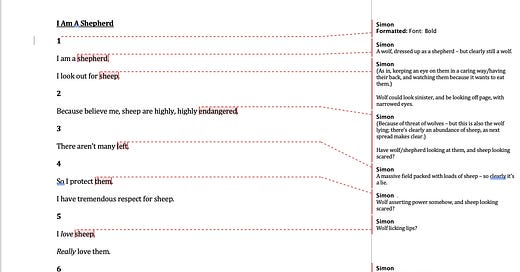



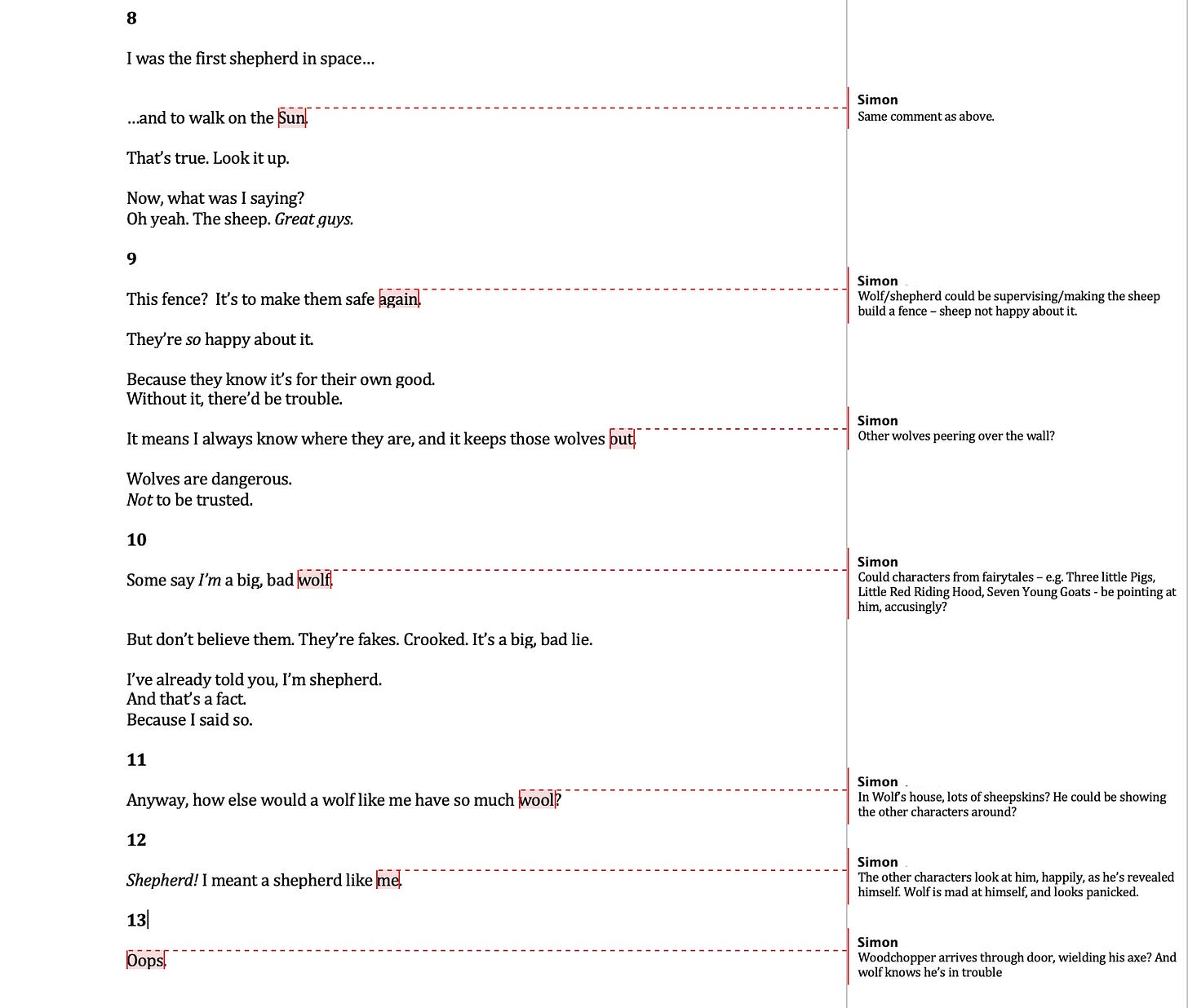
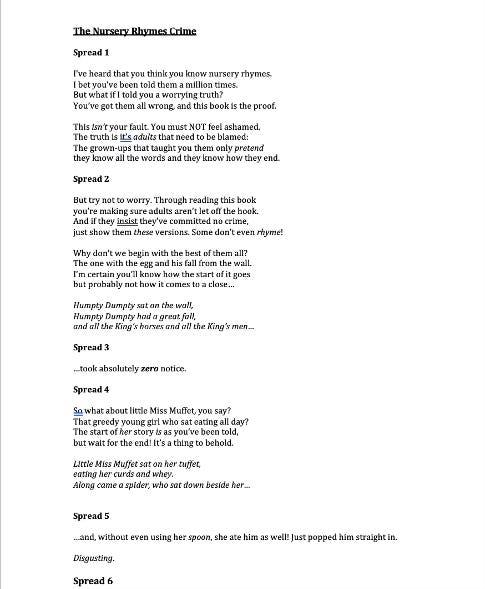
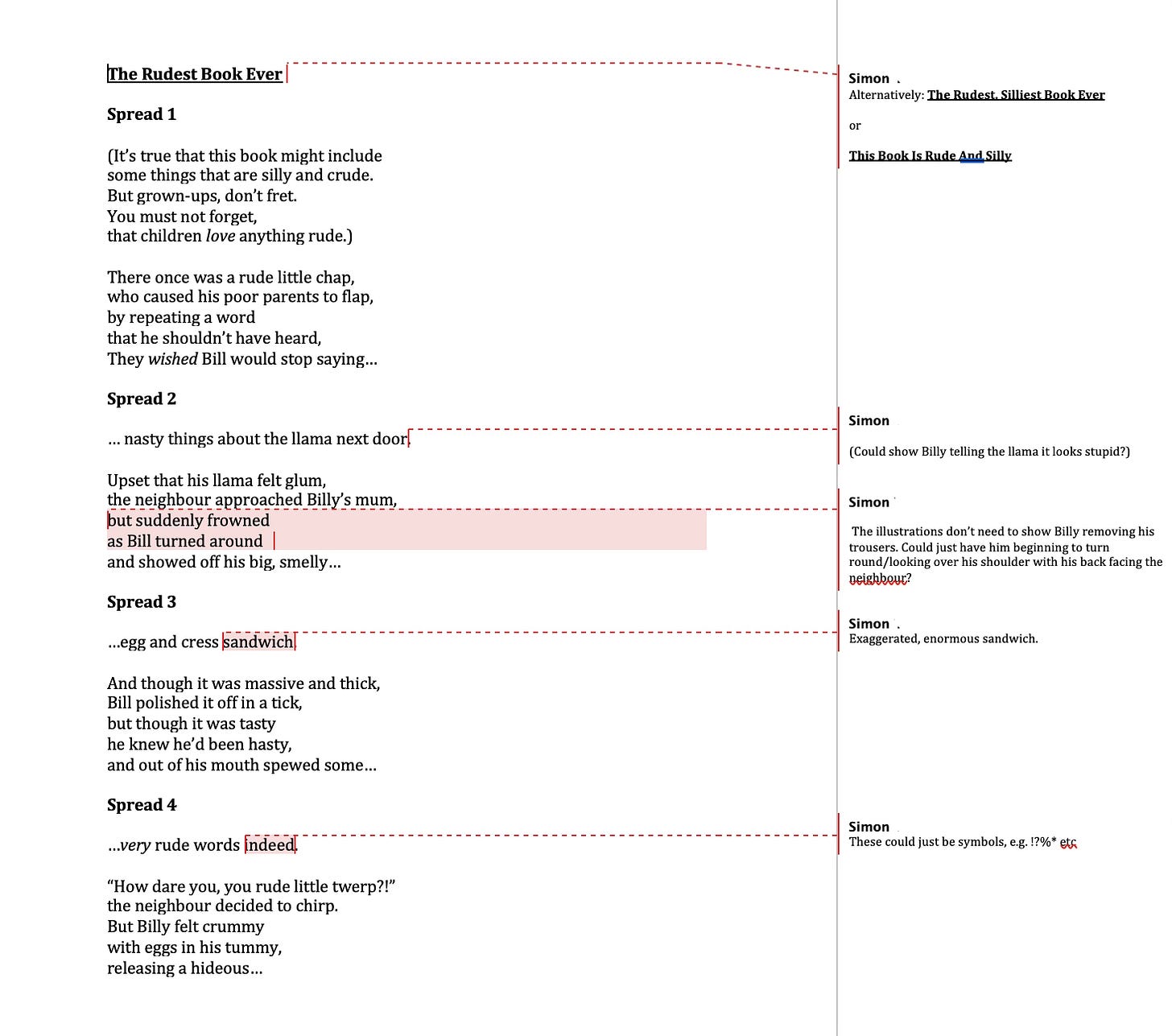
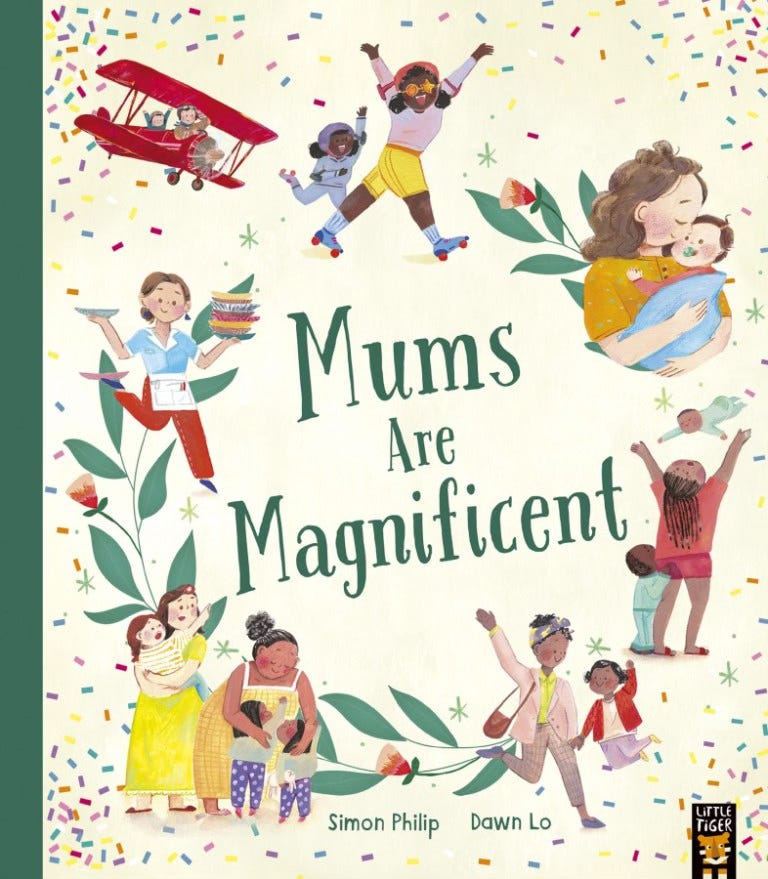
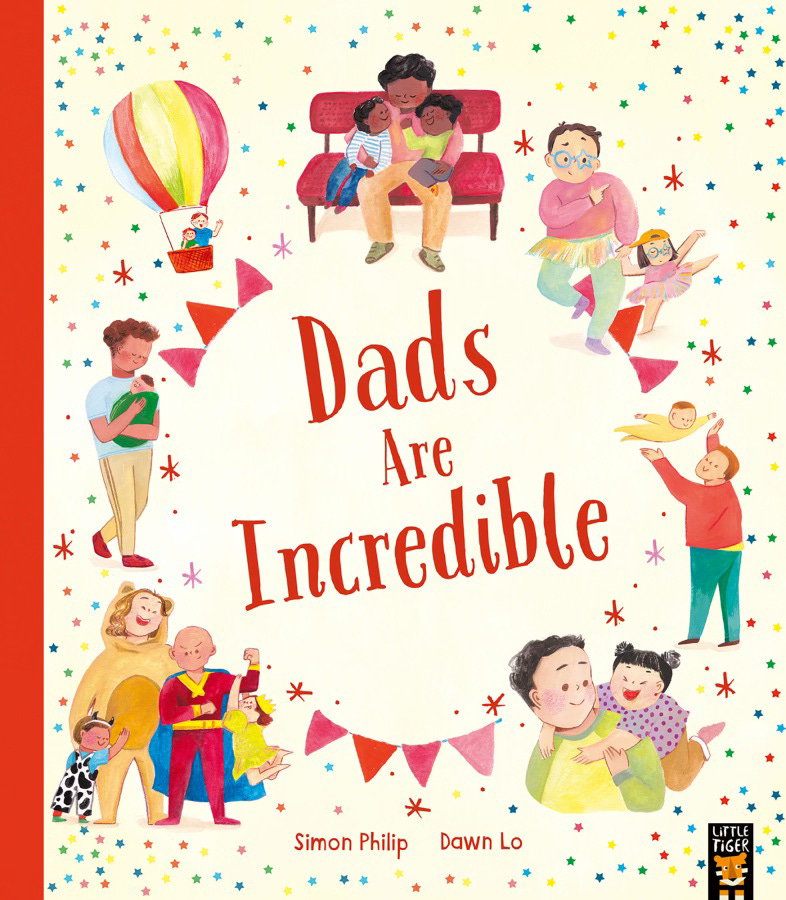
Wow. I don't know if I'm more impressed with how many texts you've written or the records you've kept. I wish I was this organised!
Love this Simon, I'm hugely interested in the numbers - I feel like other people are on submission every other month with a new batch of texts and my output is... dramatically less!!!